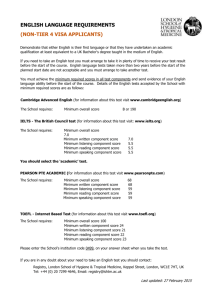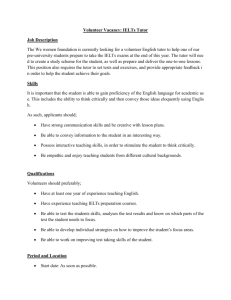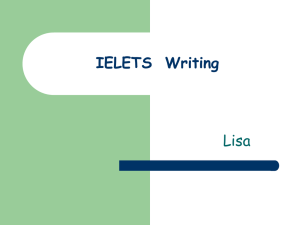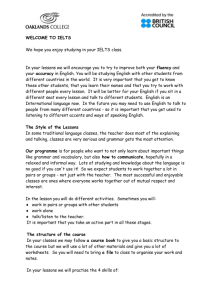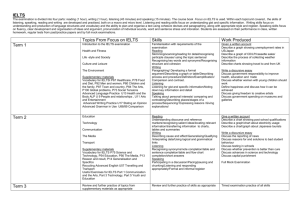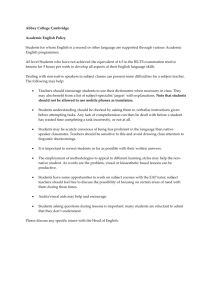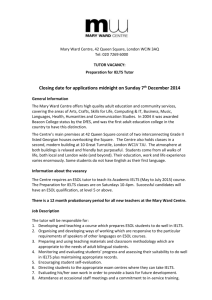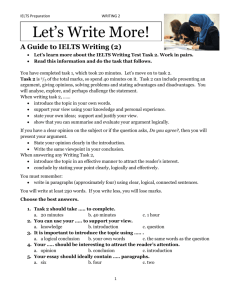Content
advertisement
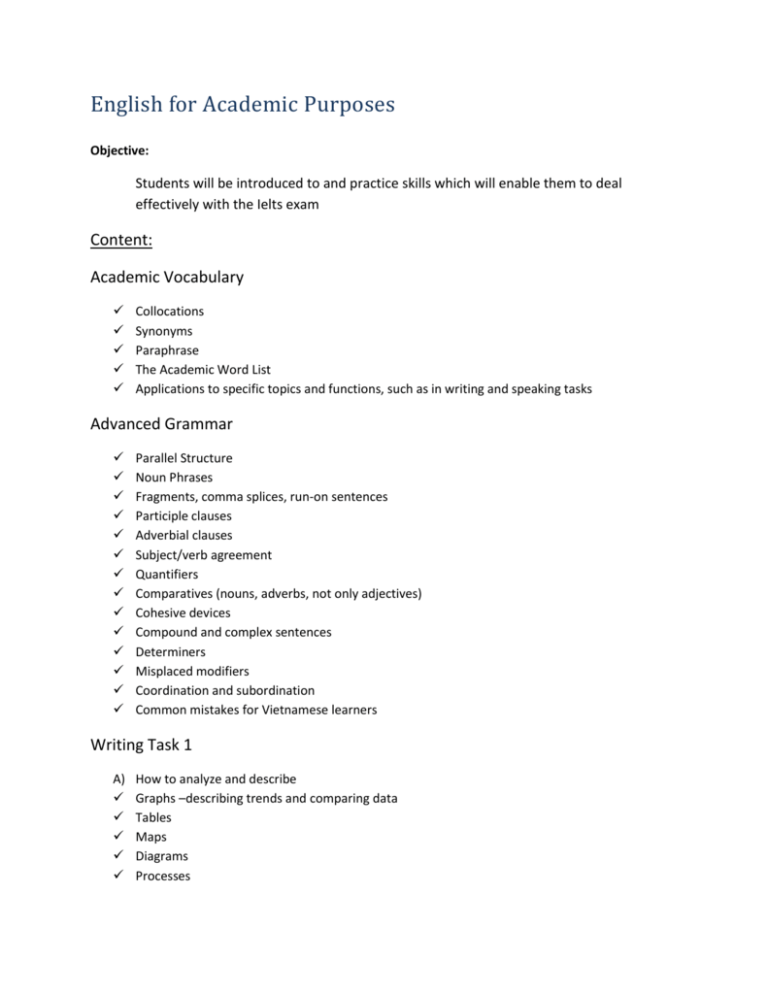
English for Academic Purposes Objective: Students will be introduced to and practice skills which will enable them to deal effectively with the Ielts exam Content: Academic Vocabulary Collocations Synonyms Paraphrase The Academic Word List Applications to specific topics and functions, such as in writing and speaking tasks Advanced Grammar Parallel Structure Noun Phrases Fragments, comma splices, run-on sentences Participle clauses Adverbial clauses Subject/verb agreement Quantifiers Comparatives (nouns, adverbs, not only adjectives) Cohesive devices Compound and complex sentences Determiners Misplaced modifiers Coordination and subordination Common mistakes for Vietnamese learners Writing Task 1 A) How to analyze and describe Graphs –describing trends and comparing data Tables Maps Diagrams Processes B) Specific language for expressing The topic The main idea Details for each type of task and subtask Correlations, assumptions or conclusions Writing task 2 The main focus will be on writing task 1, but there will also be focus on applying grammar and vocabulary to writing sections of writing task 2 Material Reading Ielts style topics Test taking skills Introduction to all types of questions and basic skills for answering them in short texts Identification of paraphrase Practice dealing with tricky questions Strategies for self improvement Listening Ielts level listening tasks Ielts style listening tasks Error analysis Strategies for self improvement Speaking Expressing opinions Debating Discussing current events Making predictions Dealing with problems and solutions Presenting Making effective descriptions Giving explanations IELTS 1 IELTS 1 CONTENT: Introduce students to the 4 sections of the IELTS Exam. This will include: READING Introduction to the content and format of the test Strategies for dealing with each question type Detecting and avoiding tricks and traps Working with academic vocabulary: collocations, paraphrase, noun phrases LISTENING Introduction to the content and format of each section Strategies for dealing with each type of question Anticipation of answers Error analysis Features of the phonology of English: word and sentence stress, linking sounds WRITING (task 2) Introduction to Ielts essay writing Structure of Essays – all essay types: Argumentative essay, discussion essay, problem solution essay Analysis of questions Pre-writing Writing introductions and conclusions Body Paragraphs – cohesion and coherence Providing support and giving examples Sentence structure Vocabulary – Specific language features for different functions and essay styles SPEAKING Introduction to the content and format of each section Useful language to use in each section Strategies for improving performance Video analysis of other students’ performances Verbal practice and analysis ACADEMIC VOCABULARY Academic vocabulary is considered the key to being successful in the Ielts and it will be emphasized throughout the course. LEARNING OBJECTIVES and OUTCOMES A) Students will become familiar with all parts of the Ielts exam B) Students will learn strategies and develop skills for dealing with each part of the exam C) Students will increase their knowledge and ability to deal with academic vocabulary in context Evaluation Criteria for IELTS 1: Classwork: 1 - Project – 3 groups Listening Project Weekly Reading Journal Weekly Vocab / Grammar Test (Monday) Written Assignments Video assignments Participation: Homework In class work, effort and contribution to class Attendance Midterm Final The final Exam will be a mock IELTS test. Students will progress to IELTS 2 based on the results of the mid-term and final exams. Class-work will also be a very important factor in progressing to IELTS 2. Any student with 5.0 or above and acceptable class-work may progress to IELTS 2. IELTS 2 OBJECTIVE Apply the skills learned in Ielts 1 to exam situations To improve performance on all sections of the exam To master time management To deal more effectively with paraphrase To analyze one’s own strengths and weaknesses To create and implement a self-study plan based on the above To understand and exploit Ielts evaluation criteria CONTENT: READING Timed test practice: Individual sections and full tests Strategies for dealing with multiple question types Strategies for avoiding difficult questions Strategies for dealing with the test holistically LISTENING Practice in exam simulations Strategies to avoid tricks and improve results Self analysis Analysis of features of spoken English (sentence and word stress, linking sounds, the schwa etc.) WRITING (task 1 and 2) Timed practice (task 1 and 2 individually and together) Analysis of results using band score descriptors Strategies for improving performance Review of grammatical and lexical issues Speaking Practice of all sections Advanced analysis and strategies for improvement of performance EVALUATION Class work, Participation Mid Term Final Both the mid-term and final exams will be Ielts level mock exams. See the following to understand the evaluation results and recommendations: Overall band score 6.5 6.0 5.5 and below Students are strongly recommended to take the real IELTS as soon as possible Students may be recommended to take the real IELTS as soon as possible. However, in some cases, further study may be recommended… (usually self study) Students will be recommended to study one more course here at ITEC or at another centre before attempting the real Ielts
